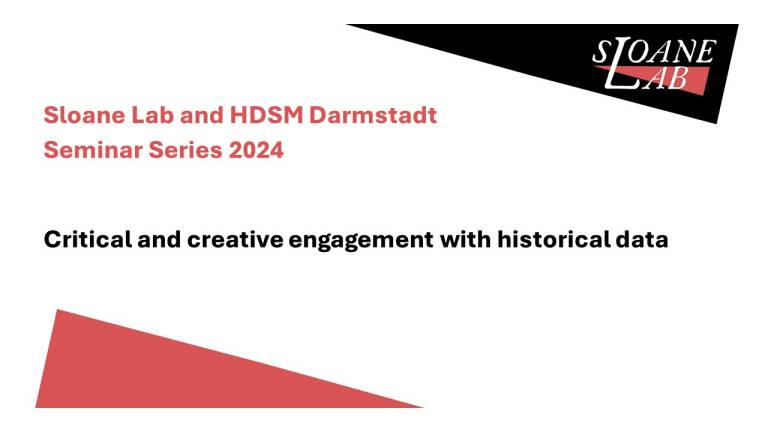[ONLINE] The enframing of narratives and the post-Fordist Global South Digital Humanities ecosystem
28 May 2024, 3:30 pm–4:45 pm

Sloane Lab and HDSM Darmstadt are pleased to welcome Arjun Sanyal, Assistant Librarian at the Central University of Himachal Pradesh (CUHP)
This event is free.
Event Information
Open to
- All
Availability
- Yes
Cost
- Free
Organiser
-
Marco Humbel, UCLDH Associate Director (ECR)
The enframing of narratives and the post-Fordist Global South Digital Humanities ecosystem: Rethinking the social informatics of digital cultural heritage in an era of techno-optimism
The computational turn, in the humanities scholarship, particularly, with the advent of the Collections as data movement, has resulted in the increasing discursive marginalization of Digital Humanities (DH) scholarly practices and narratives from the Global South, in the Heideggerian (1971) paradigm of enframing.
Hence, this demands a discursive-textual mode of critical analysis, entailing the materialization of Bowker’s (1994) idea of “infrastructural inversion” to dismantle the reductionist post-Fordist scholarly communications edifice, placing the onus, equally, on the GLAM professionals and the techno-humanists.
In this presentation, I will expound a conceptual framework, informed by Paul Ricœur’s (1992) hermeneutical construction of “narrative identity” and Henry Giroux’s (1993) notion of Border Pedagogy, for rethinking the DH workflow, transnationally, for deconstructing Western DH grand narratives and creating counter-texts.
By blending Ricœur’s hermeneutical technique, collaboratively, with digital multimedia storytelling tools and Giroux’s idea of Border Pedagogy, it is posited, will enable the re-contextualization of computational narratives, facilitated by GLAM professionals re-envisioning themselves as "border crossers" to reinforce the extant DH epistemic milieux, sociotechnically.
In conclusion, this conceptual edifice is an exercise in participatory praxis, as a counterpoint to the techno-deterministic DH research ecosystem, for enabling intercultural dialogue and envisioning a new sociology of knowledge.
Register for the Zoom event and view the full seminar series programme: https://critical-creative.eventbrite.co.uk
The Sloane Lab Seminar Series is convened by Marco Humbel (Sloane Lab & UCLDH), Nadezhda Povroznik (TU Darmstadt), Julianne Nyhan (TU Darmstadt & UCL) and Andrew Flinn (UCL). Administrative support is provided by Lucy Stagg (UCLDH & UCL IAS).
This joint virtual seminar is co-hosted by University College London, TU Darmstadt, the British Museum and the Natural History Museum.
The symposium is funded by the Towards a National Collection programme (Arts and Humanities Research Council) as an activity of the Sloane Lab Discovery Project.
About the Speaker
Arjun Sanyal
Assistant Librarian at Central University of Himachal Pradesh (CUHP), Dharamshala
Arjun Sanyal holds a Masters in Library and Information Science from the Tata Institute of Social Sciences (TISS), Mumbai. Being commended with the responsibility of conducting information literacy sessions, for students and doctoral scholars, among other responsibilities, that involves taking a holistic view of the socio-informational reality, Arjun is particularly intrigued about rethinking the library's role in furthering the discipline of digital cultural informatics, from a sociotechnical perspective. In this regard, Arjun, as someone with a prior exposure to the realm of social sciences, as graduate and undergraduate student of History, is specifically keen on exploring how libraries can enable the formulation of new computational social narratives and/or methodologies. Lastly but not the least, since libraries, as critical knowledge infrastructures are ideologically contested social milieux, within the broader realm of transnational knowledge scenario, involving epistemological frameworks deeply intertwined with the globalized matrix of socio-cultural and economic power structures, hence, Arjun is intrigued about making capital of his myriad professional development experiences to effect utilitarian transdisciplinary, transnational collaborations among GLAM institutions for the evolution of a sustainable, scholarly communications ecosystem.
 Close
Close

